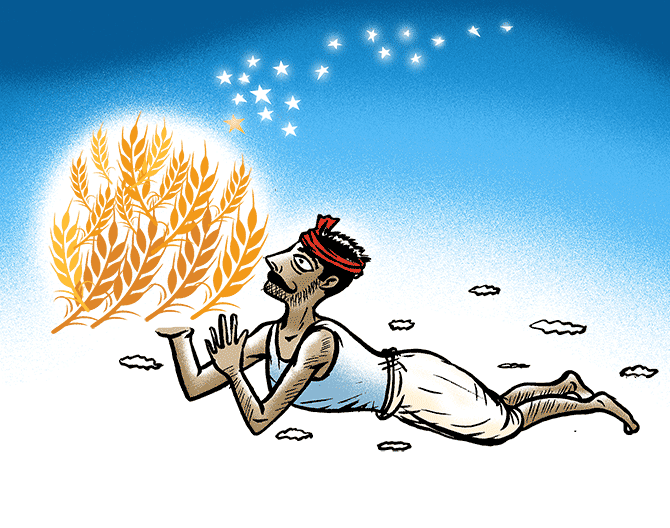The farm sector has been resilient to the COVID-19 shock and is estimated to grow at 3.9 per cent this fiscal, the Economic Survey said on Monday, while suggesting to the government to give priority to crop diversification, allied farm sectors and alternative fertilisers like Nano urea.

The Economic Survey 2021-22 also pitched for increasing agriculture research and development (R&D) and organic farming, besides use of new technologies like drones.
"The performance of the agriculture and the allied sector has been resilient to the COVID-19 shock. ...Growth in allied sectors including livestock, dairying and fisheries has been the major drivers of overall growth in the sector," the Survey said.
The agriculture sector has experienced buoyant growth in the past two years.
It is estimated to grow at 3.9 per cent during 2021-22, from 3.6 per cent in the previous fiscal, it added.
Stating that the allied agri-sectors are steadily emerging to be high growth segments, the Survey said, "Increasing importance of allied sectors including animal husbandry, dairying and fisheries in growth and income of the farmers indicates that focus needs to shift more towards harnessing the potential of allied activities."
The latest Situation Assessment Survey (SAS) has also found that the allied sectors have been stable sources of income across groups of agricultural households, accounting for about 15 per cent of their average monthly income.
According to the SAS report 2021, the average monthly income per agricultural household, as per paid out expenses approach, works out to be Rs 10,218, compared to Rs 6,426 as per the last SAS Report of 2014.
With increasing fragmentation of holdings, the Survey said there is also a need to improve productivity of small and marginal farmers through development and implementation of small holding farm technologies.
Urging the government to focus on crop diversification, the Survey said the existing cropping pattern is skewed towards cultivation of sugarcane, paddy and wheat, which has led to depletion of fresh groundwater resources at an alarming rate in many parts of the country.
However, crop diversification can be used as a tool to promote sustainable agriculture, reduction in import dependence and higher incomes for the farmers.
"Crop diversification towards oilseeds, pulses and horticulture needs to be given priority by addressing the core issues of irrigation, investment, credit and markets in their cultivation," it said.
While the government has adopted the use of minimum support price (MSP) as a signal to encourage crop diversification, there is also a need for coordinated action from the state governments to facilitate the shift to high value and less water consuming crops to enable realisation of the objective of doubling farmers' income in a sustainable way, it added.
On R&D in agriculture and allied sectors, the Survey said it can play a major role in realisation of sustainable agriculture practice that efficiently meets the objectives of nutritional security and improvement in farm income.
Research shows that every rupee spent on agricultural research and development yields better returns compared to returns on money spent on subsidies or other expenditure on inputs, it said.
"The increase in agriculture R&D therefore may improve productivity in the crop and allied sectors," it added.
That apart, the Survey said there is a need to explore options and promote use of alternative fertilisers such as Nano urea and organic fertilisers which protect the soil, which are more productive and contribute to higher nutrient use efficiency.
"Focus should be on use of new technology including drones and AI-based decision support systems, reduction in use of chemical fertilizers and use of low-cost organic inputs and supporting start-ups for innovations," it added.
Farm credit worth over Rs 7.36 lakh crore disbursed in H1 of FY'22
Farm credit worth over Rs 7.36 lakh crore has been disbursed to farmers during the first six months of the 2021-22 fiscal year, according to the Economic Survey.
The government has fixed a farm credit target of Rs 16.50 lakh crore for the current fiscal.
"... Against this target, a sum of Rs 7,36,589.05 crore has been disbursed till September 2021," the survey said.
During the 2020-21 fiscal, Rs 15,75,398 crore agricultural credit was disbursed by banks, against the target of Rs 15,00,000 crore for the year.
The government has also announced Rs 2 lakh crore concessional credit boost to 2.5 crore farmers through Kisan Credit Cards (KCCs).
In pursuance of this, the Survey said that banks have issued KCCs to 2.70 crore eligible farmers as on January 17, this year.
Apart from this, a total of 67,581 KCCs have been issued to fishers and fish farmers by December 17, 2021 and over 14 lakh fresh KCCs were sanctioned for animal husbandry and dairying farmers by December 10, 2021, the survey noted.










